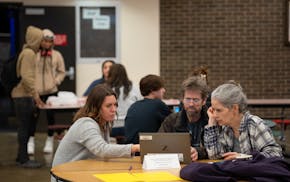HOFFMAN, Minn. — Muriel Krusemark grew up here, so she can point to any business on Main Avenue and tell its history, which is her own. The plumber's shop sits where the meat market once operated. The galleria was a furniture store and before that, a bakery. The new shop on the corner? An arcade.
But a decade ago, there wasn't much to point to. Storefronts sat vacant. "All of this," said Krusemark, 73, gesturing to three buildings, "was empty."
Then Krusemark returned to town. Since the retiree took a part-time gig as Hoffman's economic development coordinator in 2007, businesses have filled the city's main drag — two modest blocks bordered by silver grain silos. With doggedness and good humor, Krusemark has helped this small city 25 miles southwest of Alexandria fight economic forces that have emptied out similar Main Streets across Minnesota and the country. The gobbling up of small farms. The closing of schools. The arrival of big-box retailers in distant, larger cities.
Krusemark doesn't try to lure hot, 100-employee companies to Hoffman, pop. 681. Instead, her day-to-day work sustains small projects that are a big deal to residents.
She checks people in and out of Motel 1, the one-room hotel on Main. For months, she cooked the meals served at the farmers market, her brainchild. Most days, she closes out the till at the Main Street Galleria, a marketplace inspired by her trip to Wadena, Minn.
"These are not stories you'd hear from the economic developer in Minneapolis," said David Fluegel, executive director of the Southwest Regional Sustainable Development Partnership. "But for a city the size of Hoffman, in my estimation it just doesn't get any better than Muriel."
'I'll speed it up!'
Einar Gudjonsson was painting the back room of his new shop when Krusemark came through the front door with a cascading "Hello, hello!"
He told her his last steps: Painting, putting in carpet, hanging the sign: Midwest Hotel Furniture Liquidators.
"So you'll be open by the Harvest Festival?" she asked. When he looked bewildered, she continued: "This is a good time of year. There's about 30 campers out at the lake — good customers that won't be here in September."
"I'll speed it up!" Gudjonsson promised, hands in the air. "I'm on his case," she explained with a wink.
Neighbors and former interns call Krusemark persuasive. Tenacious. "She's a spitfire," said Jeffrey Wencl.
Wencl was 21 years old and a senior at the University of Minnesota, Morris when he interviewed in 2008 for an internship with Krusemark's office. "You're supposed to be talking about your qualifications," he said. "But instead, she was like, here's the plan. And you better get on board."
Krusemark knew what residents wanted, Wencl said. Not a fancy restaurant or a movie theater, but a doctor who came to town once a week. She launched a plan to get a clinic, persuading practitioners in Alexandria and Fergus Falls to spend a few hours a week in Hoffman.
She nabbed an $86,000 grant to renovate a "falling down building" and enlisted inmates to do the demolition work. Today, the Hoffman branch of Prairie Ridge Hospital and Health Services is open three days a week.
Wencl said that victory showed residents that her vision for a better Hoffman was real. "Then she had leverage — look, these plans are not just fairy tales," he said.
Four years after graduating and working as an officer in the U.S. Navy, Wencl visited Hoffman while on transfer leave. "It was just night and day," he said. "Everything she talked about had come to fruition."
Krusemark also has big plans for Wencl, who's headed to law school: "He's coming back to start his lawyers practice here," she said, pointing to his future law office.
A different downtown
Krusemark knows Hoffman will never again be the town she bused to for school after milking cows each morning. Or even the city of the 1970s, when she and her then-husband owned a grocery store.
For one thing, there is no school. It closed in the 1990s. When Krusemark worked at the school in the 1960s as a secretary and bookkeeper, seven full buses brought children in from the country to the K-12 school, which had 420 students. Now, kids go to Barrett or Kensington, 7 miles in either direction.
David Starner, who still farms his family's land, measures the shift this way: "When I was a boy, there were 20 or 30 farms that sold to the creamery," he said. "That same area today, there's four."
Small towns like Hoffman are grappling with people and businesses migrating to regional centers such as Alexandria — Alec, to people here — as the share of Minnesotans living in rural areas has shrunk in recent decades. In Grant County, where Hoffman sits, the change was dramatic: From 1960 to 2010, the population dropped by nearly a third, or more than 2,800 people, U.S. Census Bureau data show. Today, more than 22 percent of people living in the county are 65 years or older — among the highest percentages in the state.
"The farms got bigger, and people moved away," Krusemark said. "There's just not the population" in the countryside to support a school or the kind of storefronts that packed Main Avenue in the 1960s and '70s.
Krusemark left Hoffman, too. After getting divorced in 1989, she was "broke," she said. "I had to go where the money is." She worked six days a week as a deli manager at a Shakopee grocery store while helping her daughter run a Prior Lake bridal shop.
But she always knew she'd return home to Hoffman. There, she built a "grandma house" — one level, no steps — two blocks from downtown and worked at a deli in Alexandria before hearing about the Hoffman job.
"It is exactly what I love to do," Krusemark said. "It's a real challenge for me."
The challenge is steep: Small towns' Main Street businesses used to be interdependent with agriculture, Fluegel said. "That relationship has all changed. Those businesses are really struggling to figure out what's next for their future."
Krusemark encourages shops to get creative. The appliance store opens on Fridays, only. The clinic takes appointments three days a week. The grocery store also boasts a cafe, party room and laundromat with six machines.
To launch her projects — including a food shelf, a community garden and next, a bike path to Elk Lake — she tapped the West Central Initiative and the Center for Small Towns, on the Morris campus, for expertise, grants and manpower. The Center for Small towns adopted Hoffman, sending students to intern with Krusemark. Each intern has been "a gift from heaven," she said.
When Marcus Grubbs began his internship with Krusemark in 2008, he was studying environmental science. But the work sparked his interest in planning. After going to graduate school for planning and economic development, he became a community planner for the Headwaters Regional Development Commission in Bemidji.
"Some of the things that people spend a lot of money to learn, Muriel knew intuitively," Grubbs said. On the job, he regularly hears Krusemark's voice in his head.
Many towns focus too much energy in attracting the next 40-employee company, Grubbs said. But Muriel always said "one job in a small town really can support a family of four," he said. "One family at a time, one job at a time."
'You really can't say no'
Just before folks began arriving at the city park for the Wednesday night farmers market, Krusemark was trying to get the coffee going. She put her ear to the urn, but it was silent.
"Norwegians without hot coffee is not a good thing," Krusemark said, laughing.
She got a neighbor to fiddle with the fuse box. She sent another to fetch more potato chips. She had her intern check in with the vendors.
"She puts it in a way — you really can't say no," said resident Scott Dalum, 60. "But you know, she does so much for other people that you want to help out."
Krusemark pulled on plastic gloves and joined the other volunteers, scooping fruit and plating it alongside chicken salad sandwiches. Residents manned a dozen booths, selling quilts, Tupperware, eggs and jam. Heidi Nygard sat with a sign advertising her new business: Western Minnesota Auctions.
When Krusemark first talked about bringing a clinic to downtown, Nygard thought she was crazy. "This is Hoffman," she remembers thinking. "So many of us get complacent."
Nygard nodded to the dozens of old couples and families gathered at picnic tables, crediting the crowd to Krusemark. "This was such a sleepy community," she said, "and look at us now."
But setbacks have accompanied successes. In 2013, the nursing home in town, where Krusemark had once worked as a cook, closed. A few "for rent" and "for sale" signs have popped up in storefront windows. Want a one-room motel? It's on the market.
"My real fear is being able to sustain what we've done," Krusemark said. "In a small town, if businesses start to close, it can be a real domino effect.
"We've gotta work on keeping what we've got."
Jenna Ross • 612-673-7168

FAFSA completions in Minnesota drop amid flawed efforts to update form

Wisconsin Republicans ignore governor's call to spend $125M to combat 'forever chemicals'

Man killed in Minnetonka by law enforcement started gun battle with deputies, BCA says

